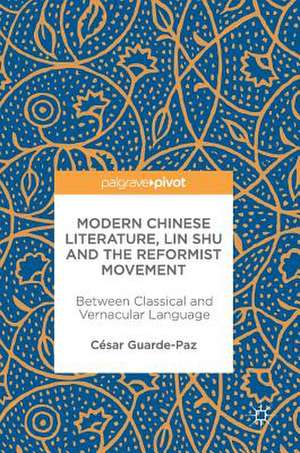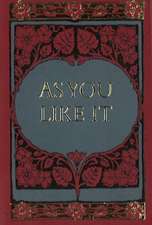Modern Chinese Literature, Lin Shu and the Reformist Movement: Between Classical and Vernacular Language
Autor César Guarde-Pazen Limba Engleză Hardback – 29 iun 2017
This Pivot reconsiders the controversial literary figure of Lin Shu and the debate surrounding his place in the history of Modern Chinese Literature. Although recent Chinese mainland research has recognized some of the innovations introduced by Lin Shu, he has often been labeled a 'rightist reformer' in contrast to 'leftist reformers' such as Chen Duxiu and the new wave scholars of the May Fourth Movement. This book provides a well-documented account of his place in the different polemics between these two circles ('conservatives' and 'reformers') and provides a more nuanced account of the different literary movements of the time. Notably, it argues that these differences were neither in content nor in politics, but in the methodological approach of both parties. Examining Lin Shu and the 'conservatives' advocated coexistence of both traditional and modern thought, the book provides background to the major changes occurring in the intellectual landscape of Modern China.
| Toate formatele și edițiile | Preț | Express |
|---|---|---|
| Paperback (1) | 456.10 lei 6-8 săpt. | |
| Springer Nature Singapore – 12 dec 2018 | 456.10 lei 6-8 săpt. | |
| Hardback (1) | 561.54 lei 6-8 săpt. | |
| Springer Nature Singapore – 29 iun 2017 | 561.54 lei 6-8 săpt. |
Preț: 561.54 lei
Nou
Puncte Express: 842
Preț estimativ în valută:
107.45€ • 112.49$ • 88.91£
107.45€ • 112.49$ • 88.91£
Carte tipărită la comandă
Livrare economică 05-19 aprilie
Preluare comenzi: 021 569.72.76
Specificații
ISBN-13: 9789811043154
ISBN-10: 9811043159
Pagini: 128
Ilustrații: XIII, 128 p. 3 illus.
Dimensiuni: 148 x 210 x 13 mm
Greutate: 2.94 kg
Ediția:1st ed. 2017
Editura: Springer Nature Singapore
Colecția Palgrave Macmillan
Locul publicării:Singapore, Singapore
ISBN-10: 9811043159
Pagini: 128
Ilustrații: XIII, 128 p. 3 illus.
Dimensiuni: 148 x 210 x 13 mm
Greutate: 2.94 kg
Ediția:1st ed. 2017
Editura: Springer Nature Singapore
Colecția Palgrave Macmillan
Locul publicării:Singapore, Singapore
Cuprins
Introduction.- The polemic in context: Hu Shi’s conversion to radicalism.- Lin Shu’s first polemic: Hu Shi and the Xin qingnian journal.- Lin Shu’s second polemic: Zhang Houzai and Cai Yuanpei.- Cai Yuanpei’s deceiving response: An analysis of its contents and fallacies.- Lin Shu as a liberal humanist.- Conclusion.
Notă biografică
César Guarde-Paz holds a Ph.D. in Chinese Philosophy from the University of Barcelona, Spain. He is a Research Fellow at the Faculty of Philosophy, University of Barcelona, in Spain, and was awarded a government scholarship in 2012 to continue his studies at Sun Yat-sen University, Guangzhou. His research interests include Early Confucianism, Late Qing and Early Republican Chinese Literature and Chinese Linguistics, but also Western Philosophy and notably the Prussian philosopher Friedrich Nietzsche.
Textul de pe ultima copertă
This Pivot reconsiders the controversial literary figure of Lin Shu and the debate surrounding his place in the history of Modern Chinese Literature. Although recent Chinese mainland research has recognized some of the innovations introduced by Lin Shu, he has often been labeled a 'rightist reformer' in contrast to 'leftist reformers' such as Chen Duxiu and the new wave scholars of the May Fourth Movement. This book provides a well-documented account of his place in the different polemics between these two circles ('conservatives' and 'reformers') and provides a more nuanced account of the different literary movements of the time. Notably, it argues that these differences were neither in content nor in politics, but in the methodological approach of both parties. Examining Lin Shu and the 'conservatives' advocated coexistence of both traditional and modern thought, the book provides background to the major changes occurring in the intellectual landscape of Modern China.
di
di
Caracteristici
Reveals how Lin Shu's contributions impacted on Chinese Modern Literature and the new Wave and the May Fourth Movement Offers key insights into Lin Shu's role in the literary controversy between Classical and Vernacular Language Broadens readers' understanding of major changes in the intellectual landscape of Modern China Includes supplementary material: sn.pub/extras










